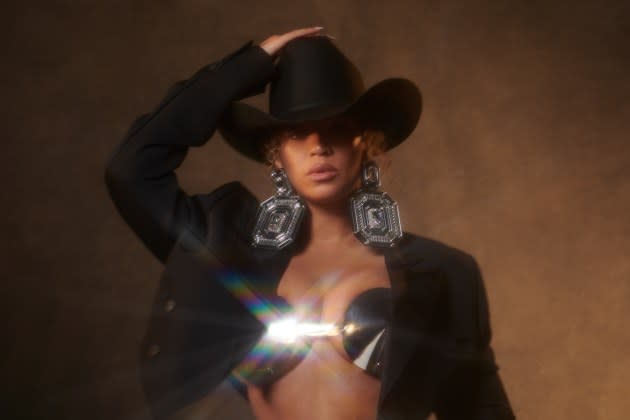Beyoncé ‘Did Not Feel Welcomed’ in Country — ‘Cowboy Carter’ Emerged From Those Limitations

The disco horse on the cover of Beyoncé’s dance opus Renaissance has come to life on the cover of Cowboy Carter, the second act of her ongoing album series set to arrive on March 29. Perched on a white horse, the musician holds the reins in one hand and a flowing American flag in the other. Her wrangling of control in the artwork is reflective of the place from which Cowboy Carter emerged.
“This album has been over five years in the making. It was born out of an experience that I had years ago where I did not feel welcomed…and it was very clear that I wasn’t,” Beyoncé wrote on Instagram on Tuesday, seemingly referencing the backlash to her appearance with the Chicks at the 2016 CMA Awards. She performed the Lemonade country cut “Daddy Lessons” for the Nashville audience, sparking outrage and controversial conversations about her place in the genre as a Black woman.
More from Rolling Stone
Beyoncé Fans Are Not Happy That Some 'Cowboy Carter' Songs Were Cut From CD and Vinyl
On 'Cowboy Carter,' Beyoncé Isn't Going Country. She's Reinventing American Music in Her Own Image
Sarah Paulson Says She and Pedro Pascal Disagree on Who Beyoncé Blew a Kiss To
“But, because of that experience, I did a deeper dive into the history of Country music and studied our rich musical archive,” she continued. “It feels good to see how music can unite so many people around the world, while also amplifying the voices of some of the people who have dedicated so much of their lives educating on our musical history.”
Beyoncé’s roots in country music date back years before “Daddy Lessons,” first emerging during her upbringing in Houston, Texas and trickling into her music as both a solo artist and with Destiny’s Child. Those decades of experience culminated in the creation of the forthcoming album — led by “Texas Hold ‘Em” and “16 Carriages” — which she proudly described in her post, saying: “This ain’t a Country album. This is a “Beyoncé” album. This is act ii COWBOY CARTER.”
But, she added, “the criticisms I faced when I first entered this genre forced me to propel past the limitations that were put on me. Act ii is a result of challenging myself, and taking my time to bend and blend genres together to create this body of work.”
The lengthy statement arrives as the introduction to a 10-day countdown to the album’s arrival. Beyoncé also teased some more secrets she’s keeping under wraps, writing: “I have a few surprises on the album, and have collaborated with some brilliant artists who I deeply respect. I hope that you can hear my heart and soul, and all the love and passion that I poured into every detail and every sound.”
Dolly Parton recently teased a potential cover of “Jolene” being featured on the album, though little more is known about any forthcoming collaborations.
Following the arrival of “Texas Hold ‘Em” and “16 Carriages,” Beyoncé collaborator Robert Randolph, who was handpicked by the musician to perform steel guitar on the singles, told Rolling Stone: “Beyoncé already had an idea of what she wanted to do. She wanted to do something with some playing, with some country fire. She said she liked the way I make my instrument sound like a singer.”
He added: “It’s great for her to go this route. In country music for a longest time, it almost seemed like it was supposed to be out of left field when a Black artist says, ‘Hey, I’m going to do a country record.’ It’s crazy that the whole world doesn’t understand the history of country music and fiddles, dobros, and banjos. Where do you think that stuff came from? Who was living in the barn? Who were the people living in the back houses?”
Following the release of the two singles, “Texas Hold ‘Em” reached Number One on the Billboard Hot 100 chart, becoming Beyoncé’s ninth solo single to top the chart. It also hit Number One on the Hot Country Songs chart, making Beyoncé the first Black woman artist to top that chart, something she said in her statement made her feel “honored,” adding: “That would not have happened without the outpouring of support from each and every one of you. My hope is that years from now, the mention of an artist’s race, as it relates to releasing genres of music, will be irrelevant.”
Cowboy Carter arrives less than two years after Renaissance, another step towards reclamation. “I focused on this album as a continuation of RENAISSANCE,” Beyoncé added towards the end of the post. “I hope this music is an experience, creating another journey where you can close your eyes, start from the beginning and never stop.”
Best of Rolling Stone